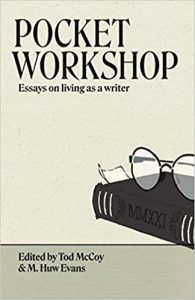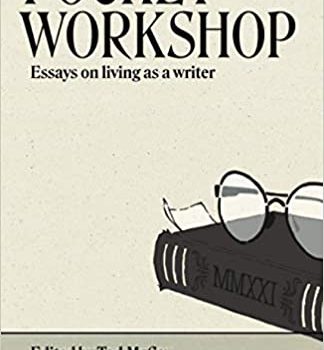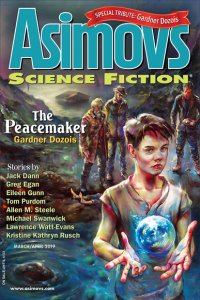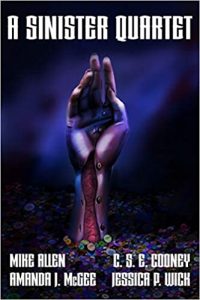Alvaro Zinos-Amaro Reviews Pocket Workshop: Essays on Living as a Writer, Edited by Tod McCoy & M. Huw Evans
 Pocket Workshop: Essays on Living as a Writer, Tod McCoy & M. Huw Evans, eds. (Hydra House 978-0997951073, $17.95, 196pp, pb) February 2021.
Pocket Workshop: Essays on Living as a Writer, Tod McCoy & M. Huw Evans, eds. (Hydra House 978-0997951073, $17.95, 196pp, pb) February 2021.
Gathered here are 28 essays (six reprints, 22 originals) by instructors of the Clarion West Writers Workshop, intended, as Tod McCoy explains in his foreword, as “a way to give back to a community who may not be able to attend the workshop by delivering thoughts and insights about writing and process from writers who have taught at Clarion.” Those who might benefit most from these insights, McCoy goes on to say, are neither beginning nor advanced writers, but rather “writers with one foot firmly in the door.” Co-editor M. Huw Evans underlines the humanistic value of the workshop and these lessons. In her introduction, Neile Graham, who has helped to run the Clarion West program for many years, makes a compelling case that “writers and writing can always get stronger. Writers and their stories can always be more, get better, dig deeper, wax wiser.” Indeed. Fitting, then, that this collection is better, deeper, and wiser than most such tomes.
Karen Lord’s “Being and Becoming a Writer” makes for an excellent first macro-perspective piece, touching on ideas other contributors elaborate on. Lord summarizes things she knew early on in her writing career and, more importantly, things she wished she would have known, ranging from an examination of why “the ‘starving/suffering artist’ myth” is a harmful proposition, to simple advice such as picking up a new hobby “that gets you away from writing and into using your mind and body in other ways.” Ian McDonald’s “Proverbs of Hell for Writers” is comprised of 94 morsel-sized comments, interrogations, prescriptions, and provocations (I was most amused by item 21, “Avoid Freud”). Paul Park’s similarly impressionistic and poetic “Neowise” touches on a variety of writing-related elements, like creating an interesting character, and ambiguity in fiction. Susan Palwick’s “Matters of Life and Death” uses the alchemy of affective autobiographical reflection to transform “the only three universal rules of writing: 1. Read. 2. Write. 3. Use what works” into three far more personal rules. Elizabeth Hand draws on a quarter century of creative writing teaching to talk about how writing improves when “Tapping the Source” of one’s experiences, and provides a specific flash fiction prompt as a case study. Jack Skillingstead’s “Feed Your Engine” uses a memorable train metaphor to emphasize the importance of “a working-class mindset” in a writing career, while in “Congratulations on Learning to Juggle – Now Get on the Unicycle”, Daryl Gregory waxes eloquent on the “fractally hard” nature of writing and the importance of leaning into this escalating difficulty. Also germane to the broader writing life, Cat Rambo’s “On Mentors and Mentees” suggests practical ways to enter into a productive mentor-mentee relationship and pitfalls to avoid along the way. Speaking of which, we segue into Vonda N. McIntyre’s expansive “Pitfalls of Writing Science Fiction & Fantasy: General Useful Information & Other Opinionated Comments”, which gleefully dissects exposition, “half-baked weasels,” and other redundancies, subjunctive tension, rampant capitals, neologisms, and other common writing challenges, including a summary of ways to likely get your manuscript rejected.
Standard craft elements are thoroughly addressed. Tina Connolly & Caroline M. Yoachim’s collaborative “We All Have to Start Somewhere: Finding Your Process and Making it Work for You”, for instance, is a fascinating study in contrasting “character-driven” vs. “plot-driven” short fiction writing processes, including useful means of identifying which type of writer you might be. Nancy Kress expounds on the techniques of successfully “Setting the Scene”, identifying different types of scenes and their functions. Samuel R. Delany’s focus, meanwhile, is on “Thickening the Plot”; this rich piece, as fresh today as when Delany composed it in 1972, explores, among other things, the challenge writers face to “make the story interesting (to themselves, if no one else), yet keep it believable (because, somehow, when it ceases to be believable on some level, it ceases to be interesting).” Tobias Buckell’s “Some Thoughts on Exposition” summarizes five ways, with pros and cons, of delivering exposition within a dramatic narrative. Andy Duncan’s “Channeling Voices” reveals the importance of voice to the author’s own fiction, and breaks down, as much as such a thing is possible in a short space, the main determinants of voice in story. In “The Narrative Gift as a Moral Conundrum”, an essay with adroit observations such as “Story goes. Plot elaborates the going,” Ursula K. Le Guin engages with the mystery of raw storytelling talent: “An irresistibly readable story can be told in the most conventional, banal prose, if the writer has the gift.” In the learned and profoundly far-ranging “The Old Marvellous”, John Crowley dwells on allegory, “likely the least loved of all literary forms.” Meanwhile, James Patrick Kelly concisely delivers exactly what is promised by the title of his piece, “The Three Laws of Great Endings and My Two Shameless Hacks”, not only providing practical tips but fascinating ideas on how various types of “resonances” undergird great endings.
How do writers prepare to achieve their intended effects? Connie Willis’s “The Devil Is in the Details” hones in on the importance of Jane Austen’s “minute particulars” and what Vladimir Nabokov called a story’s “secret nerves.” It pairs nicely with Nisi Shawl’s later “Something to Cry About”, which discusses examples of the type of knowledge and words needed for the successful depiction of Black hair in fiction. Thematically, Willis’s piece is amplified by Ken MacLeod’s “Researching Imaginary Worlds”, which offers counsel well beyond the purview of “research” in the strict sense of the word.
The theme of overcoming difficulties related to production informs at least three substantial pieces. Eileen Gunn’s brilliant “Going Through an Impasse: Evading Writer’s Block” starts by positing that “If you can’t cure writer’s block, at least you can learn to write in spite of it, because being blocked doesn’t mean you’re doing writing wrong,” and then proceeds to enumerate all manner of helpful strategies to do just that. Hiromi Goto’s confessional “*Take As Needed”, which delves into the author’s writing crisis, complements the aforementioned in a deeply personal way. Cory Doctorow’s “Writing in the Age of Distraction” summarizes six proven techniques to consistently get words on the page, despite the world’s seemingly ceaseless interruptions, electronic and otherwise.
Four instructors explore less traditional but equally important matters. In “Coincidentally…” Stephen Graham Jones makes a compelling case for coincidence enabling effective story openings but making for poor endings. Helen Marshall’s “Status” smartly uses Marshall’s creative writing teaching experience to probe the power difference in the relationship between two characters, whether in a story or real life. Henry Lien’s “Diversity Plus: Diverse Story Forms, Not Just Diverse Faces” tackles an engrossing array of non-Western story forms, such as kishōtenketsu. Finally, Octavia E. Butler’s list-structured “Positive Obsession” explores her early experiences reading and writing, the burden of her intense shyness growing up, and her eventual journey to (at the time the essay was originally published, in 1989) full-time writing. “Obsession can be a useful tool if it’s positive obsession,” Butler notes in this poignant and illuminating piece. “Using it is like aiming carefully in archery.”
As this brief survey hopefully indicates, these essays range widely in tone and style, and they often aim at altogether different targets, but, to use Butler’s analogy, they consistently hit the bull’s-eye. Given its uniformly high quality and engaging presentation, this volume easily joins the ranks of some of my other favorite writing craft books, such as Damon Knight’s Creating Short Fiction (1981; third ed. 1997), David Lodge’s The Art of Fiction (1992), Nancy Kress’s Beginnings, Middles & Ends (1993; repr. 2001), and Jeff VanderMeer’s Booklife (2009) and Wonderbook: The Illustrated Guide to Creating Imaginative Fiction (2013; rev. and exp. ed. 2018). This may be a pocket workshop, but it’s also a deep well of hard-earned literary wisdom, whose own fine writing – many of these pieces exemplify techniques espoused by others – renders it easily assimilable.
This review and more like it in the March 2021 issue of Locus.
 While you are here, please take a moment to support Locus with a one-time or recurring donation. We rely on reader donations to keep the magazine and site going, and would like to keep the site paywall free, but WE NEED YOUR FINANCIAL SUPPORT to continue quality coverage of the science fiction and fantasy field.
While you are here, please take a moment to support Locus with a one-time or recurring donation. We rely on reader donations to keep the magazine and site going, and would like to keep the site paywall free, but WE NEED YOUR FINANCIAL SUPPORT to continue quality coverage of the science fiction and fantasy field.
©Locus Magazine. Copyrighted material may not be republished without permission of LSFF.








